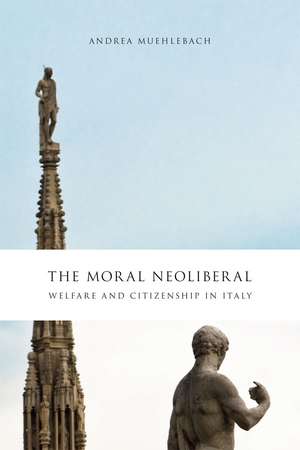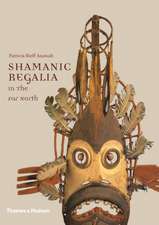The Moral Neoliberal: Welfare and Citizenship in Italy: Chicago Studies in Practices of Meaning
Autor Andrea Muehlebachen Limba Engleză Paperback – 12 iun 2012
Morality is often imagined to be at odds with capitalism and its focus on the bottom line, but in The Moral Neoliberal morality is shown as the opposite: an indispensible tool for capitalist transformation. Set within the shifting landscape of neoliberal welfare reform in the Lombardy region of Italy, Andrea Muehlebach tracks the phenomenal rise of voluntarism in the wake of the state’s withdrawal of social service programs. Using anthropological tools, she shows how socialist volunteers are interpreting their unwaged labor as an expression of social solidarity, with Catholic volunteers thinking of theirs as an expression of charity and love. Such interpretations pave the way for a mass mobilization of an ethical citizenry that is put to work by the state.
Visiting several sites across the region, from Milanese high schools to the offices of state social workers to the homes of the needy, Muehlebach mounts a powerful argument that the neoliberal state nurtures selflessness in order to cement some of its most controversial reforms. At the same time, she also shows how the insertion of such an anticapitalist narrative into the heart of neoliberalization can have unintended consequences.
Din seria Chicago Studies in Practices of Meaning
-
 Preț: 231.82 lei
Preț: 231.82 lei -
 Preț: 282.53 lei
Preț: 282.53 lei -
 Preț: 200.26 lei
Preț: 200.26 lei -
 Preț: 183.60 lei
Preț: 183.60 lei -
 Preț: 236.64 lei
Preț: 236.64 lei -
 Preț: 186.32 lei
Preț: 186.32 lei -
 Preț: 237.74 lei
Preț: 237.74 lei -
 Preț: 229.35 lei
Preț: 229.35 lei -
 Preț: 217.71 lei
Preț: 217.71 lei -
 Preț: 260.44 lei
Preț: 260.44 lei -
 Preț: 268.20 lei
Preț: 268.20 lei -
 Preț: 246.07 lei
Preț: 246.07 lei -
 Preț: 284.66 lei
Preț: 284.66 lei -
 Preț: 230.16 lei
Preț: 230.16 lei -
 Preț: 403.00 lei
Preț: 403.00 lei - 23%
 Preț: 669.93 lei
Preț: 669.93 lei -
 Preț: 242.40 lei
Preț: 242.40 lei -
 Preț: 392.77 lei
Preț: 392.77 lei - 15%
 Preț: 195.04 lei
Preț: 195.04 lei - 9%
 Preț: 287.12 lei
Preț: 287.12 lei - 17%
 Preț: 166.70 lei
Preț: 166.70 lei - 14%
 Preț: 199.02 lei
Preț: 199.02 lei - 18%
 Preț: 178.07 lei
Preț: 178.07 lei - 19%
 Preț: 148.73 lei
Preț: 148.73 lei - 22%
 Preț: 433.25 lei
Preț: 433.25 lei - 18%
 Preț: 152.10 lei
Preț: 152.10 lei
Preț: 292.28 lei
Nou
Puncte Express: 438
Preț estimativ în valută:
55.93€ • 60.74$ • 46.98£
55.93€ • 60.74$ • 46.98£
Carte tipărită la comandă
Livrare economică 23 aprilie-07 mai
Preluare comenzi: 021 569.72.76
Specificații
ISBN-13: 9780226545400
ISBN-10: 0226545407
Pagini: 288
Ilustrații: 5 halftones
Dimensiuni: 152 x 229 x 20 mm
Greutate: 0.45 kg
Editura: University of Chicago Press
Colecția University of Chicago Press
Seria Chicago Studies in Practices of Meaning
ISBN-10: 0226545407
Pagini: 288
Ilustrații: 5 halftones
Dimensiuni: 152 x 229 x 20 mm
Greutate: 0.45 kg
Editura: University of Chicago Press
Colecția University of Chicago Press
Seria Chicago Studies in Practices of Meaning
Notă biografică
Andrea Muehlebach is assistant professor of anthropology at the University of Toronto.
Cuprins
Preface
Acknowledgments
Part IAcknowledgments
Chapter 1: An Opulence of Virtue
Death of a King
Markets and Morals
An Opulence of Virtue
Chapter 2: Ethical Citizenship
A Crisis of Loneliness
Who Cares?
Ethical Citizenship
The Moral Neoliberal
Part II
Chapter 3: Consecrations: From Welfare State to Welfare Community
The Oath
Welfare Community
Sacred Social
Sacralizing “Activity”
A Temple of Humanity
The Ethical State
Social Capitalism
The Catholicization of Neoliberalism
Part III
Chapter 4: The Production of Compassion
A Heartfelt Citizenship
The Production of Dispassion
The Production of Compassion 1: The Public Management of Virtue
The Production of Compassion 2: Education of Desire
The Production of Compassion 3: Arts of Suffering, Feeling, Listening
The Production of Compassion 4: Empowerment
Doubt
Privatizing the Public Sphere
Chapter 5: An Age Full of Virtue
Super Seniors
An Age Full of Virtue
Labor, Life Cycle, and Generational Contract
Learning to Labor, or, Citizenship as Work
Care of the Self
A New Generational Contract
Chapter 6: Aftereffects of Utopian Practice
The Question of Solidarity
Lavoro or Impegno? Work or Commitment?
Passions at Work
Aftereffects of Utopian Practice
From Politics to Ethics
From Ethics to Politics; or, the Social Life of Social Citizenship
Chapter 7: The Private Face of Privatization
Enemy in the House
The Professor and the Angel
Ethical Citizenship as Relational Labor
The Ethics of Relational Labor
Appearing in Public
Disengagement
Wounding and Healing
Bibliography
Notes
Index
Recenzii
“In The Moral Neoliberal: Welfare and Citizenship in Italy, Andrea Muehlebach invites readers to undo their assumptions about neoliberalism by showing how an ethical turn brings care, love, and the sacred deeply within the fold of its thought and practice. In her intellectually aggressive dismantlings, labyrinthine analytics appear straightforward, and in her lush prose, the contemporary becomes sensually tangible, gently hoisted right up to our faces. . . . Deftly theoretical and bountifully ethnographic, this outstanding book inaugurates new modes of inquiry and reengineers our thinking on these important problems.”
“Relevant beyond the Italian case, Muehlebach’s book is as much a contribution to the anthropology of neoliberal humanitarian actors and the workings, tensions and ambivalences of their ethical journeys, as it is a brilliant example of an anthropology of the state from below, analyzing citizens’ subjectification and their participation in state-making. Much more is needed of this kind of anthropology in and of Europe, especially at this historical moment, when many European states actively produce their absence through politics of austerity. To ethnographically fathom which forms of care are produced in the absence of the state, by whom, through which kinds of social imaginaries and who is left behind are pressing research questions, ones which should take inspiration and guidance from Muehlebach’s book.”
“Recounting the vicissitudes of Milanese Italians who have become gradually more involved in helping unprivileged people, Muehlebach magisterially illustrates the experience of individuals, collectives, a civil society and, in part, the postmodern condition of the West. . . . considering the lack of sociological and political imagination that seems to characterize the current political discourse inside and outside Italy, Muehlebach,with the post-Keynesian, post-welfarist idea of ‘ethical citizenship’, must be credited for a very powerful effort to enrich the debate.”
“As has been recently remarked by Mathieu Hilgers, ‘while anthropology is a latecomer to the field, anthropological studies of neoliberalism are now displaying great theoretical and empirical creativity.’ A convincing demonstration comes from this thoughtful book by Andrea Muehlebach, whose very title looks provocative and paradoxical since it is almost axiomatic to regard neoliberalism as antithetical to morality. . . . Very incisively written and clearly argued even when it tackles complex questions, this book has the great merit of showing that [in the words of Muehlebach] ‘the contemporary neoliberal order works to produce more than rational, utilitarian, instrumental subjects,’ and that the privatization of care it promotes is able to draw – ambiguously but effectively—on highly different ethical practices, not least those of leftist men and women who are openly critical of capitalism and neoliberalism.”
“In a book that is both carefully documented and beautifully conceptualized, Andrea Muehlebach has explored a question of great relevance for contemporary debates about the forms of governmentality and subjectivation associated with the rise of neoliberalism: the new ‘ethical citizenship,’ which substitutes public systems of social security with voluntary forms of collective caretaking. Running contrary to some influential recent analyses of ‘self-entrepreneurship’ as a modality of voluntary servitude in a society entirely governed by market rules, she does not, however, contribute to the complacent image of the new mass consumption society. Rather, she describes a social dynamic of great indetermination, both ethically and politically.
“The Moral Neoliberal is an outstanding book addressing with great precision and authority a decisive series of transformations unfolding in Italy and, by extension, across Europe. The ethnographic narrative is vibrant, the argumentation is crisp, and the analysis is persuasive. Andrea Muehlebach’s investigation is premised on a forceful rejection of the conventional understanding of contemporary social order that is awkwardly and imprecisely glossed as ‘neoliberal.’ She provides an alternative architecture of a ‘moral neoliberalism’ populated by engaged, reflexive subjects who are experimenting with the imperatives of what she terms ‘ethical citizenship.’ The results are breathtaking.”--Douglas Holmes, State University of New York
“This book makes the provocative argument that neoliberal capitalism, although it has been unjust and disruptive in Italy as elsewhere, has also embraced a new kind of social solidarity based on volunteer care-giving. Dr. Muehlebach takes us inside the daily practices of retiree volunteers caring for frail elderly in a declining factory town near Milan. Through her keen eye and beautiful prose, we discover how they differentiate what they are doing from charity; how they define themselves as morally emancipated; how they understand concepts like solidarity, pity, giving, compassion, commitment, materialism, and heart. Her attention is an eye-opener for all of us trapped in easy judgment and provides a study with wide implications beyond the Italian case.”
“In this astute ethnography of voluntarism in a working-class town in the de-industrialized periphery of Milan, Andrea Muehlebach demonstrates convincingly that contemporary neoliberal reforms produce not only rational, instrumental subjects but simultaneously compassionate, ethical citizens with deep moral commitments. Her acute and nuanced analysis of the pedagogical techniques employed in volunteer training classes and the quotidian practices and discourses of volunteers, shows how unremunerated voluntary labor, construed as intimate, compassionate acts of gifting outside the realm of commodified market exchange, is cultivated and managed by legal regimes and administrative policies just as the securities of the modern Italian welfare state are being dismantled.”













